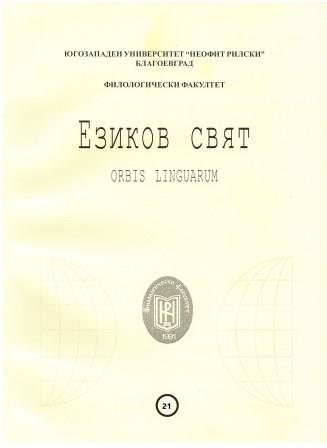DIMINUTIVES IN IVAN VAZOV’S NOVEL “UNDER THE YOKE” AND THEIR RUSSIAN EQUIVALENTS
DIMINUTIVES IN IVAN VAZOV’S NOVEL “UNDER THE YOKE” AND THEIR RUSSIAN EQUIVALENTS
Author(s): Mariya BagashevaSubject(s): Language and Literature Studies, Theoretical Linguistics, Lexis, Comparative Linguistics
Published by: ЮГОЗАПАДЕН УНИВЕРСИТЕТ »НЕОФИТ РИЛСКИ«
Keywords: diminutives; Bulgarian; Russian; equivalents; Ivan Vazov
Summary/Abstract: Slavic languages as a whole are famous for the widespread use of diminutive forms and the variety of emotive-expressive nuances that diminutives can convey. During the age of the Bulgarian Renaissance (18th - 19th century) the use of diminutives was a characteristic feature of the language, whereas after that period their use in the literary language decreased significantly. Due to the fact that Ivan Vazov wrote his historical novel in 1889-1890, the text abounds in diminutive forms, which is characteristic for Bulgarian writers of that period. The paper studies the word-formative patterns of diminutive words excerpted from Ivan Vazov's novel "Under the Yoke" and their rendering in the Russian translation of the novel. An analysis of the formation and function of diminutives in the two languages is suggested. Considering the closeness of the studied languages, an attempt is made to investigate the specifics of diminutive words in Bulgarian and Russian, as well as the reasons for their omission in the Russian translation, if any. As both Bulgarian and Russian are rich in diminutive forms, the paper analyses the differences in the use of diminutives in these languages. The method of philological analysis has been used in collecting and analyzing the corpus of excerptions.
Journal: Езиков свят - Orbis Linguarum
- Issue Year: 21/2023
- Issue No: 2
- Page Range: 044-048
- Page Count: 5
- Language: English

